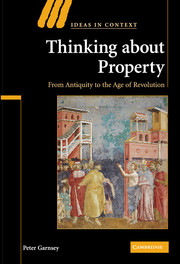
-
Select format
-
- Publisher:
- Cambridge University Press
- Publication date:
- September 2009
- December 2007
- ISBN:
- 9780511482786
- 9780521876773
- 9780521700238
- Dimensions:
- (228 x 152 mm)
- Weight & Pages:
- 0.58kg, 288 Pages
- Dimensions:
- (228 x 152 mm)
- Weight & Pages:
- 0.39kg, 288 Pages
- Subjects:
- Ancient History, Classical Studies, History of Ideas, Politics and International Relations
- Series:
- Ideas in Context (90)
You may already have access via personal or institutional login- Subjects:
- Ancient History, Classical Studies, History of Ideas, Politics and International Relations
- Series:
- Ideas in Context (90)
Book description
This book explores ancient 'foundational' texts relating to property and their reception by later thinkers in their various contexts up to the early nineteenth century. The texts include Plato's vision of an ideal polity in the Republic, Jesus' teachings on renunciation and poverty, and Golden Age narratives and other evolutionary accounts of the transition of mankind from primeval communality to regimes of ownership. The issue of the legitimacy of private ownership exercises the minds of the major political thinkers as well as theologians and jurists throughout the ages. The book gives full consideration to the historical development of Rights Theory, with special reference to the right to property. It ends with a comparative study of the Declarations of Rights in the American and French Revolutions and seeks to explain, with reference to contemporary documents, why the French recognised an inalienable, human right to property whereas the Americans did not.
Reviews
''This marvellous book combines very substantial and wide-ranging scholarship with great conceptual and analytic rigour to present a sophisticated, entirely original and highly compelling history of conceptions of property in the West from the Greeks to the 19th century.'
Raymond Geuss - Professor in Philosophy, University of Cambridge
'Garnsey’s meticulous and focused scholarship will fundamentally change our basic thinking about the origins and legitimation of property in the western tradition … I know of no other work that so accurately traces the genealogy of modern debts to ancient thought on this important subject.'
Brent Shaw - Professor of Classics and Andrew Fleming West Professor of Classics, Princeton University
'… this is a wide-ranging, learned and ambitious book that is intended to appeal to a wide audience. It should interest historians of ideas, students of political thought, scholars of religion, and anyone interested in the intellectual roots of rights theory. … Garnsey stakes out fruitful common ground for classical, Christian, and early modern legal and political texts.'
Source: Bryn Mawr Classical Review
Contents
Metrics
Altmetric attention score
Full text views
Full text views help Loading metrics...
Loading metrics...
* Views captured on Cambridge Core between #date#. This data will be updated every 24 hours.
Usage data cannot currently be displayed.
Accessibility standard: Unknown
Why this information is here
This section outlines the accessibility features of this content - including support for screen readers, full keyboard navigation and high-contrast display options. This may not be relevant for you.
Accessibility Information
Accessibility compliance for the PDF of this book is currently unknown and may be updated in the future.


